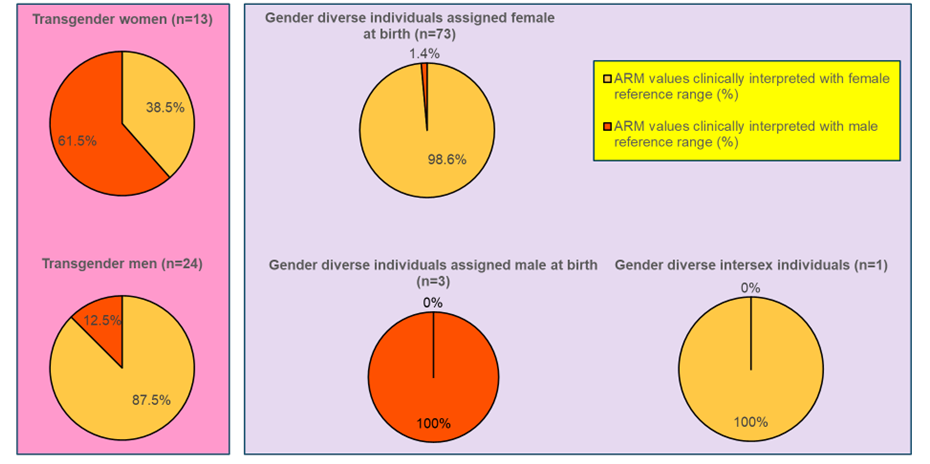Tuesday Poster Session
Category: Functional Bowel Disease
P5063 - Assessing the Interpretations of Anorectal Manometry Using Current Sex-based Reference Values in Transgender and Gender Diverse Individuals With Suspected Anorectal Defecatory Dysfunction
Tuesday, October 28, 2025
10:30 AM - 4:00 PM PDT
Location: Exhibit Hall
- KJ
Kara J. Jencks, MD (she/her/hers)
Mayo Clinic
Rochester, MN
Presenting Author(s)
Kara J. Jencks, MD1, Taylor D. Andrews, BA2, Xiao Jing Wang, MD1, Nicholas Oblizajek, MD1, Caroline Davidge-Pitts, MBBCh1, Emrys (Fiona) Fonseca, MBChBAO, MS1, William S. Harmsen, MS1, Jean Fox, MD1, Michael Camilleri, MD, DSc1, Victor Chedid, MD, MSc1
1Mayo Clinic, Rochester, MN; 2Mayo Clinic School of Graduate Medical Education, Jacksonville, FL
Introduction: Anorectal manometry (ARM) is often used clinically to help diagnose patients with suspected anorectal defecatory dysfunction. The sex-based reference ranges used for clinical interpretation of ARM have been validated in presumed cisgender women and men. We do not know if these values are appropriate for transgender and gender diverse (TGD) individuals (TGDI). This study aimed to assess which sex-based reference range was used clinically for ARM interpretation in TGDI and to compare the number of abnormalities when using presumed cisgender female and male reference ranges for interpretation.
Methods: This was a retrospective, tri-site cohort study of TGDI who underwent ARM clinically for signs of anorectal defecatory dysfunction. ARM values for each manometric parameter were compared by gender identity (ANOVA). Each ARM parameter was classified as normal or abnormal according to the presumed cisgender female reference range and again to the presumed cisgender male reference range. Discordance between the two sex-based interpretations were assessed. We compared the total number of abnormalities using the presumed cisgender male and female ranges for at least one, at least 2 (Fisher’s exact test), and the total number of manometric abnormalities (Wilcoxon signed-rank test).
Results: Our cohort included 111 TGD individuals. There was a significant difference for percent anal relaxation (p=0.017) and residual anal pressure (p=0.033) during defecatory maneuver when comparing transgender men, transgender women, and gender diverse individuals. 12.5% of transgender men and 38.5% of transgender women were interpreted with values that align with gender identity (Figure 1). When comparing values when interpreted by presumed cisgender male and female reference ranges, discordance was high for residual anal pressure, intrarectal pressure, and rectoanal pressure gradient. For at least 2 manometric abnormalities (p=0.0318) and total number of manometric abnormalities (p< 0.001), there were significant differences.
Discussion: The sex-based reference range selected for clinical interpretation of ARM in TGD was not consistent. The results suggest that the selection of which current sex-based reference range used can result in a difference in interpretation and clinical diagnosis of anorectal defecatory dysfunction. ARM in asymptomatic TGDI need to be studied to create validated reference ranges.

Figure: Figure 1: Sex-based reference range used during clinical interpretation of anorectal manometry in transgender and gender diverse individuals. Figure 1 Legend: Figure 1 includes pie charts which compare which existing sex-based reference ranges were used to clinically interpret the anorectal manometry data. Each pie chart represents a different gender identity and sex assigned at birth combination.
Disclosures:
Kara Jencks indicated no relevant financial relationships.
Taylor Andrews indicated no relevant financial relationships.
Xiao Jing Wang indicated no relevant financial relationships.
Nicholas Oblizajek indicated no relevant financial relationships.
Caroline Davidge-Pitts indicated no relevant financial relationships.
Emrys (Fiona) Fonseca indicated no relevant financial relationships.
William Harmsen indicated no relevant financial relationships.
Jean Fox indicated no relevant financial relationships.
Michael Camilleri: Alfasigma – Consultant. Amylyx – Consultant. Biocodex – Grant/Research Support. BioKier – Consultant. Brightseed Bio – Consultant, Grant/Research Support. Coloplast – Consultant. Dignify Therapeutics – Stock Options. Intercept – Consultant. Invea – Consultant. Kallyope – Consultant. McDermott Will & Emery – Consultant. Medpace – Consultant. Monteresearch – Consultant. Neurogastrx – Consultant. NGM Biopharmaceuticals – Grant/Research Support. Pfizer – Grant/Research Support. Phenomix – Stock Options. Renexxion – Consultant. SKYE Bioscience – Consultant. Sumitomo – Consultant. Synlogic – Consultant. Vanda – Grant/Research Support.
Victor Chedid: Pfizer – Grant/Research Support. Takeda – Consultant.
Kara J. Jencks, MD1, Taylor D. Andrews, BA2, Xiao Jing Wang, MD1, Nicholas Oblizajek, MD1, Caroline Davidge-Pitts, MBBCh1, Emrys (Fiona) Fonseca, MBChBAO, MS1, William S. Harmsen, MS1, Jean Fox, MD1, Michael Camilleri, MD, DSc1, Victor Chedid, MD, MSc1. P5063 - Assessing the Interpretations of Anorectal Manometry Using Current Sex-based Reference Values in Transgender and Gender Diverse Individuals With Suspected Anorectal Defecatory Dysfunction, ACG 2025 Annual Scientific Meeting Abstracts. Phoenix, AZ: American College of Gastroenterology.
1Mayo Clinic, Rochester, MN; 2Mayo Clinic School of Graduate Medical Education, Jacksonville, FL
Introduction: Anorectal manometry (ARM) is often used clinically to help diagnose patients with suspected anorectal defecatory dysfunction. The sex-based reference ranges used for clinical interpretation of ARM have been validated in presumed cisgender women and men. We do not know if these values are appropriate for transgender and gender diverse (TGD) individuals (TGDI). This study aimed to assess which sex-based reference range was used clinically for ARM interpretation in TGDI and to compare the number of abnormalities when using presumed cisgender female and male reference ranges for interpretation.
Methods: This was a retrospective, tri-site cohort study of TGDI who underwent ARM clinically for signs of anorectal defecatory dysfunction. ARM values for each manometric parameter were compared by gender identity (ANOVA). Each ARM parameter was classified as normal or abnormal according to the presumed cisgender female reference range and again to the presumed cisgender male reference range. Discordance between the two sex-based interpretations were assessed. We compared the total number of abnormalities using the presumed cisgender male and female ranges for at least one, at least 2 (Fisher’s exact test), and the total number of manometric abnormalities (Wilcoxon signed-rank test).
Results: Our cohort included 111 TGD individuals. There was a significant difference for percent anal relaxation (p=0.017) and residual anal pressure (p=0.033) during defecatory maneuver when comparing transgender men, transgender women, and gender diverse individuals. 12.5% of transgender men and 38.5% of transgender women were interpreted with values that align with gender identity (Figure 1). When comparing values when interpreted by presumed cisgender male and female reference ranges, discordance was high for residual anal pressure, intrarectal pressure, and rectoanal pressure gradient. For at least 2 manometric abnormalities (p=0.0318) and total number of manometric abnormalities (p< 0.001), there were significant differences.
Discussion: The sex-based reference range selected for clinical interpretation of ARM in TGD was not consistent. The results suggest that the selection of which current sex-based reference range used can result in a difference in interpretation and clinical diagnosis of anorectal defecatory dysfunction. ARM in asymptomatic TGDI need to be studied to create validated reference ranges.

Figure: Figure 1: Sex-based reference range used during clinical interpretation of anorectal manometry in transgender and gender diverse individuals. Figure 1 Legend: Figure 1 includes pie charts which compare which existing sex-based reference ranges were used to clinically interpret the anorectal manometry data. Each pie chart represents a different gender identity and sex assigned at birth combination.
Disclosures:
Kara Jencks indicated no relevant financial relationships.
Taylor Andrews indicated no relevant financial relationships.
Xiao Jing Wang indicated no relevant financial relationships.
Nicholas Oblizajek indicated no relevant financial relationships.
Caroline Davidge-Pitts indicated no relevant financial relationships.
Emrys (Fiona) Fonseca indicated no relevant financial relationships.
William Harmsen indicated no relevant financial relationships.
Jean Fox indicated no relevant financial relationships.
Michael Camilleri: Alfasigma – Consultant. Amylyx – Consultant. Biocodex – Grant/Research Support. BioKier – Consultant. Brightseed Bio – Consultant, Grant/Research Support. Coloplast – Consultant. Dignify Therapeutics – Stock Options. Intercept – Consultant. Invea – Consultant. Kallyope – Consultant. McDermott Will & Emery – Consultant. Medpace – Consultant. Monteresearch – Consultant. Neurogastrx – Consultant. NGM Biopharmaceuticals – Grant/Research Support. Pfizer – Grant/Research Support. Phenomix – Stock Options. Renexxion – Consultant. SKYE Bioscience – Consultant. Sumitomo – Consultant. Synlogic – Consultant. Vanda – Grant/Research Support.
Victor Chedid: Pfizer – Grant/Research Support. Takeda – Consultant.
Kara J. Jencks, MD1, Taylor D. Andrews, BA2, Xiao Jing Wang, MD1, Nicholas Oblizajek, MD1, Caroline Davidge-Pitts, MBBCh1, Emrys (Fiona) Fonseca, MBChBAO, MS1, William S. Harmsen, MS1, Jean Fox, MD1, Michael Camilleri, MD, DSc1, Victor Chedid, MD, MSc1. P5063 - Assessing the Interpretations of Anorectal Manometry Using Current Sex-based Reference Values in Transgender and Gender Diverse Individuals With Suspected Anorectal Defecatory Dysfunction, ACG 2025 Annual Scientific Meeting Abstracts. Phoenix, AZ: American College of Gastroenterology.


